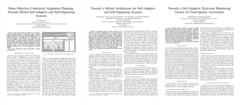New conference papers at the 5th IEEE International Conference on Autonomic Computing and Self-Organising Systems - ACSOS 2024! [22.08.24]
Elia Henrichs and Christian Krupitzer from the Department of Food Informatics are co-authors of the peer-reviewed conference paper ‘Towards a Self-Adaptive, Real-time Monitoring System for Food Quality Assessment’, Pia Schweizer, Elia Henrichs and Christian Krupitzer from the Department of Food Informatics are co-authors of the peer-reviewed conference paper ‘Towards a Hybrid Architecture for Self-Adaptive and Self-Organising Systems’, Pia Schweizer from the Department of Food Informatics is author of the peer-reviewed conference paper ‘Many-Objective Centralized Adaptation Planning: Towards Hybrid Self-Adaptive and Self-Organizing Systems, of the 5th IEEE International Conference on Autonomic Computing and Self-Organising Systems - ACSOS 2024 (CORE Rating: -; Peer reviewed).1. The publication "Towards a Self-Adaptive, Real-time Monitoring System for Food Quality Assessment" by Elia Henrichs (Department of Foodinformatics (150L), and Computational Science Hub (CSH), University of Hohenheim, Stuttgart, Germany) with the co-author Christian Krupitzer (Department of Foodinformatics (150L), and Computational Science Hub (CSH), University of Hohenheim, Stuttgart, Germany), 2. The publication "Many-Objective Centralized Adaptation Planning: Towards Hybrid Self-Adaptive and Self-Organizing Systems" by Pia Schweizer (Department of Foodinformatics (150L), and Computational Science Hub (CSH), University of Hohenheim, Stuttgart, Germany), 3. The publication "Towards a Hybrid Architecture for Self-Adaptive and Self-Organizing Systems" by Pia Schweizer (Department of Foodinformatics (150L), and Computational Science Hub (CSH), University of Hohenheim, Stuttgart, Germany) with the co-authors, Jonas Lange (Intelligent Systems Group, Kiel University, Kiel, Germany), Elia Henrichs (Department of Foodinformatics (150L), and Computational Science Hub (CSH), University of Hohenheim, Stuttgart, Germany), Sven Tomforde (Intelligent Systems Group, Kiel University, Kiel, Germany), Christian Krupitzer (Department of Foodinformatics (150L), and Computational Science Hub (CSH), University of Hohenheim, Stuttgart, Germany)
"Towards a Self-Adaptive, Real-time Monitoring System for Food Quality Assessment" - Adaptive software systems can assist in reducing food waste and improving food safety by enabling a real-time quality assessment. Such systems include sensors to monitor the food’s condition and machine learning-based data analysis to predict the food’s quality and shelf life. In particular, monitoring is challenging for several reasons, e.g., the complexity of the food supply chain and dynamically changing environments. Therefore, this work describes and discusses a self-adaptive monitoring system that locates food commodities and adjusts the monitoring activity accordingly to changes in the environment.
"Many-Objective Centralized Adaptation Planning: Towards Hybrid Self-Adaptive and Self-Organizing Systems" - Driving semi-automated vehicles at close distances, called platooning, emerges as a promising strategy to address conflicts associated with the ever-increasing traffic volumes on German highways by optimizing fuel consumption and road utilization. Mapping the architecture of a self-adaptive system to platooning, a fully central coordination of vehicles would introduce a potential bottleneck, while fully decentralized decision-making might lead to conflicting adaptations. Therefore, this project aims to establish a hybrid self-adaptive and selforganizing system that is robust with micro-level autonomic adaptation decisions while centrally optimizing the decisionmaking.
"Towards a Hybrid Architecture for Self-Adaptive and Self-Organizing Systems" - In multi-agent systems, control can either be initiated from a central coordination unit, or each agent decides on its own about its next adaptation step to adjust to changes in the dynamic environment. To counteract a single point of failure as well as egoistic adaptation decisions, we propose the establishment of a hybrid architecture. Starting from static, fully centralized coordination and static, fully decentralized decisionmaking, the systems become adaptive through optimization techniques and reinforcement learning, respectively, before being merged into the hybrid system. To evaluate and compare the systems’ performance, the coordination of platooning, where vehicles drive with a low inter-vehicle distance to reduce drag and improve traffic flow, serves as a running example.

